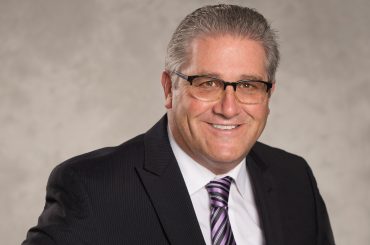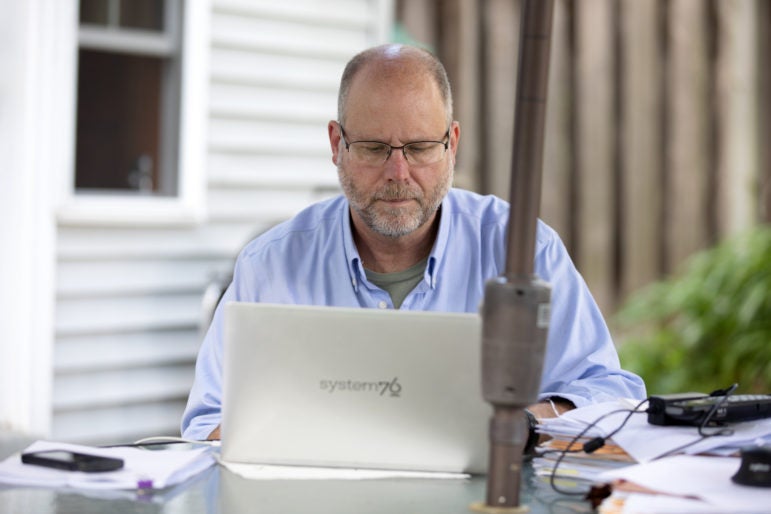People stopped traveling when the coronavirus pandemic hit, costing Jessica Barrera her job at Groome Transportation, an airport shuttle service with an office in Eau Claire. So the 40-year-old single mother joined nearly 70,000 other laid-off Wisconsinites during that third week of March: She filed her first weekly unemployment claim.
She filed another claim the next week. And the next. And the next. She continued until the Wisconsin Department of Workforce Development denied her claims in a letter that explained in bold, capital letters:
“THE CLAIMANT CANNOT RECEIVE SOCIAL SECURITY DISABILITY PAYMENTS AND UNEMPLOYMENT INSURANCE BENEFITS CONCURRENTLY.”
News with a little more humanity
WPR’s “Wisconsin Today” newsletter keeps you connected to the state you love without feeling overwhelmed. No paywall. No agenda. No corporate filter.

“I cried for days,” Barrera said. “I thought (unemployment assistance) was going to be my saving grace to help me get by until my job opened.”
Barrera has polycythemia vera, a rare disease that causes her body to produce too many red blood cells. The condition can lead to strokes, blood clots, miscarriages and other complications. She takes a blood thinner and has 16 ounces of blood removed from her body monthly to control her symptoms. She also says she grapples with depression and anxiety following a pair of family tragedies.
All that qualifies Barrera for Social Security Disability Insurance (SSDI), a federally funded program for people who have worked and paid Social Security taxes but can no longer perform “substantially gainful activity.”
The program allows Barrera to purchase health insurance through Medicare and sends her checks averaging $1,000 to $1,200 each month. Rent alone eats up nearly $900 each month, so Barrera pursues part-time work to support herself and her 10-year-old son. SSDI guidelines allow — and even encourage — part-time work so long as she does not earn more than $1,260 per month.
“You have to stay poor to keep your health care to stay alive,” Barrera said.
About 175,000 working-age Wisconsinites rely on SSDI to supplement their income. But the Republican-controlled Legislature in 2013 passed a law barring that group from simultaneously receiving unemployment insurance after losing work.
George Wentworth, an unemployment insurance specialist with the National Employment Law Project, a nonprofit that supports protections for low-wage workers and the unemployed, said he knows of only one other state — North Carolina — that also explicitly bans tapping both programs. Most states take a case-by-case approach on the issue, he added.
The administration of Gov. Tony Evers, a Democrat, is now shutting out Barrera and other SSDI recipients from a federal unemployment program: Pandemic Unemployment Assistance (PUA). Congress created the program under the CARES Act, earmarking funds for people who lost their jobs because of the pandemic but “would not qualify for regular unemployment compensation.”
A Wisconsin Department of Workforce Development spokesperson said the 2013 state law, coupled with a lack of federal guidance, left the agency with no choice but to deny benefits to Barrera and others who submitted similar claims. The result: laid-off people with disabilities cannot collect federal disaster relief during the nation’s worst economic crisis since the Great Depression.
Wentworth called Wisconsin’s denials during the pandemic “particularly harsh” for people with disabilities.
“The state, which is administering a federal program that clearly covers these workers, seems to be blocking the door to accessing those benefits as well,” he said.
Barrera is among 138 SSDI recipients to apply in vain for state unemployment insurance since March 16, according to the DWD. The agency did not have data on how many people on SSDI applied for PUA, spokesperson Ben Jedd said.
Claims Of Discrimination
[[{“fid”:”1269401″,”view_mode”:”embed_portrait”,”fields”:{“alt”:”Jessica Barrera with her son Niko”,”title”:”Jessica Barrera with her son Niko”,”class”:”media-element file-embed-portrait media-wysiwyg-align-right”,”data-delta”:”2″,”format”:”embed_portrait”,”alignment”:”right”,”field_image_caption[und][0][value]”:”%3Cp%3EJessica%20Barrera%2C%20who%20receives%20Social%20Security%20Disability%20Insurance%20(SSDI)%2C%20is%20among%20138%20Wisconsin%20SSDI%20recipients%20who%20applied%20in%20vain%20for%20state%20unemployment%20insurance%20since%20March%2016.%20She%20is%20seen%20here%20with%20her%2010-year-old%20son%2C%20Niko.%20%3Cem%3EPhoto%20courtesy%20of%20Jessica%20Barrera%3C%2Fem%3E%3C%2Fp%3E%0A”,”field_image_caption[und][0][format]”:”full_html”,”field_file_image_alt_text[und][0][value]”:”Jessica Barrera with her son Niko”,”field_file_image_title_text[und][0][value]”:”Jessica Barrera with her son Niko”},”type”:”media”,”field_deltas”:{“2”:{“alt”:”Jessica Barrera with her son Niko”,”title”:”Jessica Barrera with her son Niko”,”class”:”media-element file-embed-portrait media-wysiwyg-align-right”,”data-delta”:”2″,”format”:”embed_portrait”,”alignment”:”right”,”field_image_caption[und][0][value]”:”%3Cp%3EJessica%20Barrera%2C%20who%20receives%20Social%20Security%20Disability%20Insurance%20(SSDI)%2C%20is%20among%20138%20Wisconsin%20SSDI%20recipients%20who%20applied%20in%20vain%20for%20state%20unemployment%20insurance%20since%20March%2016.%20She%20is%20seen%20here%20with%20her%2010-year-old%20son%2C%20Niko.%20%3Cem%3EPhoto%20courtesy%20of%20Jessica%20Barrera%3C%2Fem%3E%3C%2Fp%3E%0A”,”field_image_caption[und][0][format]”:”full_html”,”field_file_image_alt_text[und][0][value]”:”Jessica Barrera with her son Niko”,”field_file_image_title_text[und][0][value]”:”Jessica Barrera with her son Niko”}},”link_text”:false,”attributes”:{“alt”:”Jessica Barrera with her son Niko”,”title”:”Jessica Barrera with her son Niko”,”class”:”media-element file-embed-portrait media-wysiwyg-align-right”,”data-delta”:”2″}}]]Unaware of the 2013 ban, Barrera first applied for regular unemployment insurance after Groome laid her off. She typically earned no more than $264 a week scheduling shuttles for the company, which suspended service through at least June 15. After DWD denied that claim, she tried for PUA aid, waiting until the department rolled out that application April 21.
PUA payments range from $163 to $370 per week, depending on lost income. Barrera hoped the aid would at least partially cover her former wages. Then came another denial.
Barrera is appealing with the pro bono help of Victor Forberger, supervising attorney for the University of Wisconsin’s Unemployment Compensation Appeals Clinic, who said he is representing about 20 people with similar cases. Forberger accuses Wisconsin of discriminating against people with disabilities, saying its denial of these claims for federal dollars runs counter to Congress’ aim — to help more people survive financially after losing their jobs to the pandemic.
More than 87,700 people of all circumstances submitted PUA applications through May 23 during a pandemic that has seen initial claims for regular unemployment insurance surge by as much as 16-times last year’s level, according to DWD.
Forberger said he is flooded with calls from out-of-work SSDI recipients who are desperately seeking PUA aid, adding to an unsustainable workload. He’s exhausted. He represents them for free, and earns most of his income by moonlighting for a “big box retailer” he declined to name.
Forberger wasn’t happy when the Legislature first blocked SSDI recipients from unemployment aid — part of a larger package the Republican-controlled Legislature enacted in 2013 to plug a deficit in Wisconsin’s Unemployment Insurance Trust Fund and eliminate perceived vulnerabilities to fraud.
A 2013 letter signed by 27 Assembly and Senate Republicans, including Assembly Speaker Robin Vos, R-Rochester, called the simultaneous collection of disability and unemployment benefits “double dipping” that “may constitute fraud” — a claim based upon what Forberger calls a misunderstanding about SSDI.
The letter alleged SSDI beneficiaries must state that they are “unable to work,” while unemployment insurance is limited to those who state they are “able to work.”
Instead, the U.S. Social Security Administration grants disability benefits to those who are “unable to engage in substantial gainful activity” — allowing them to work part time.
Former Gov. Scott Walker, a Republican, approved the unemployment insurance overhaul in July 2013 (with a minor partial veto). That prompted DWD to automatically deny about 3,500 claims from SSDI recipients over the next two years, according to an Unemployment Insurance Advisory Council report in 2015 — a time when the state saw average initial weekly unemployment insurance claims drop to their lowest point since 1989.
“The law is saying we are not going to pay you unemployment benefits based on your status as a disabled person,” Forberger said. “I think it’s discriminatory. I disagreed with it. But it’s what the Legislature passed.”
Forberger argues federal pandemic assistance clearly includes SSDI beneficiaries. The CARES Act extends those unemployment benefits to people who lost their jobs due to the coronavirus, including gig workers and others who are “not eligible for regular compensation or extended benefits under State or Federal law.“
U.S. Department of Labor guidance does not explicitly address how states should handle claims by SSDI recipients. Where the guidance is silent, states should follow their laws for administering unemployment insurance benefits, the document says.
That is why DWD is denying claims from anyone in Barrera’s shoes.
“Without a change in state law or further federal guidance, the pandemic unemployment assistance is not available for a person receiving disability payments,” said Jedd, the spokesperson.
Forberger calls the state’s explanation a “perverse twist in logic.”

“The law specifically says those who are ineligible for regular unemployment benefits under state law are entitled to pandemic unemployment systems,” he said.
Wentworth also questions whether DWD’s hands are tied. “The federal guidance doesn’t have to identify everybody who could be potentially eligible,” he said.
Forberger’s clients face a tough road in their appeals. Even if they succeed, DWD could take months or more to process their claims in an overwhelmed unemployment system that still leans on 50-year-old technology, he said.
Wisconsinites filed more than 2.4 million weekly unemployment claims from March 15 and May 23, and the department denied about 270,000 of them. The department was still processing nearly 400,000 claims, leaving many waiting for weeks and even months without income while the quagmire fuels partisan bickering.
Republicans hold Evers responsible, saying his administration has failed to quickly ramp up staff and hours to process the rush of claims. Democrats blame Republicans for failing to fund long-needed technology upgrades while enacting laws — including the 2013 overhaul — that made it harder for some jobless Wisconsinites to collect benefits.
Wisconsin lawmakers in April passed a COVID-19 relief package that waived the state’s one-week waiting period for unemployment assistance, enacted under Walker. But the law did not address processing claims from disability beneficiaries.
Advice From Advocates: Keep Trying
James Trandel, who is also appealing a denied PUA claim with Forberger’s help, said the issue seems simple: PUA is a federal program, and the federal Americans with Disability Act protects against employment discrimination.
The law should bar discrimination related to unemployment, too, he said.
The Milwaukee resident has used a wheelchair since 1983. That’s when, at age 25, he plunged from a tree during a bear hunting trip, leaving his legs paralyzed. He worked for the U.S. Postal Service in Milwaukee from 1983 to 2000 and began collecting SSDI benefits shortly after that.
[[{“fid”:”1269421″,”view_mode”:”embed_portrait”,”fields”:{“alt”:”Milwaukee resident James Trandel”,”title”:”Milwaukee resident James Trandel”,”class”:”media-element file-embed-portrait media-wysiwyg-align-right”,”data-delta”:”4″,”format”:”embed_portrait”,”alignment”:”right”,”field_image_caption[und][0][value]”:”%3Cp%3EMilwaukee%20resident%20James%20Trandel%2C%20who%20uses%20a%20wheelchair%2C%20works%20part%20time%20for%20the%20Milwaukee%20Brewers%20as%20a%20ticket%20taker.%20Trandel%20applied%20for%20federal%20Pandemic%20Unemployment%20Assistance%20after%20the%20Brewers%E2%80%99%20season%20was%20delayed.%20He%20is%20appealing%20his%20denied%20claim%20with%20the%20state.%20%3Cem%3EPhoto%20courtesy%20of%20James%20Trandel%3C%2Fem%3E%3C%2Fp%3E%0A”,”field_image_caption[und][0][format]”:”full_html”,”field_file_image_alt_text[und][0][value]”:”Milwaukee resident James Trandel”,”field_file_image_title_text[und][0][value]”:”Milwaukee resident James Trandel”},”type”:”media”,”field_deltas”:{“4”:{“alt”:”Milwaukee resident James Trandel”,”title”:”Milwaukee resident James Trandel”,”class”:”media-element file-embed-portrait media-wysiwyg-align-right”,”data-delta”:”4″,”format”:”embed_portrait”,”alignment”:”right”,”field_image_caption[und][0][value]”:”%3Cp%3EMilwaukee%20resident%20James%20Trandel%2C%20who%20uses%20a%20wheelchair%2C%20works%20part%20time%20for%20the%20Milwaukee%20Brewers%20as%20a%20ticket%20taker.%20Trandel%20applied%20for%20federal%20Pandemic%20Unemployment%20Assistance%20after%20the%20Brewers%E2%80%99%20season%20was%20delayed.%20He%20is%20appealing%20his%20denied%20claim%20with%20the%20state.%20%3Cem%3EPhoto%20courtesy%20of%20James%20Trandel%3C%2Fem%3E%3C%2Fp%3E%0A”,”field_image_caption[und][0][format]”:”full_html”,”field_file_image_alt_text[und][0][value]”:”Milwaukee resident James Trandel”,”field_file_image_title_text[und][0][value]”:”Milwaukee resident James Trandel”}},”link_text”:false,”attributes”:{“alt”:”Milwaukee resident James Trandel”,”title”:”Milwaukee resident James Trandel”,”class”:”media-element file-embed-portrait media-wysiwyg-align-right”,”data-delta”:”4″}}]]Trandel has since worked part time for the Milwaukee Brewers as a Miller Park ticket taker, quickly working his way up to supervisor. Until 2013, he could collect normal state unemployment benefits during the offseason.
Trandel unsuccessfully applied for PUA benefits after the pandemic pushed back the start of the Brewer’s season.
“I wrote in for an appeal saying, ‘Please reconsider my case. Pandemic going on,’” Trandel said.
Disabilities rights advocates still encourage similarly situated Wisconities to apply for PUA aid, despite the onslaught of denials. The federal program was meant to “protect the people that would otherwise fall through the cracks,” said Monica Murphy, managing attorney of the nonprofit Disability Rights Wisconsin.
“If we are successful in getting the state to reverse course, it will be important for people to have made a timely application for benefits,” Murphy said.
New Job, Fading Dream
Tired of waiting on the state, Barrera found a new job: processing rebates at Menards, beginning June 6.
With schools closed, she needs child care for her son, who is on the autism spectrum. She will only work weekends at Menards, making that search a little easier. Barrera must drive to work, but she recently let her car insurance lapse. She placed a lower priority on those payments, compared to food, rent and electricity as her income dwindled during the pandemic. She’s trying to fix that problem.
SSDI income limits prevent Barrera from picking up extra shifts to pay off her credit card debt that soared in recent weeks. She said her credit score has already dropped almost 30 points after she spent two years trying to improve it in hopes of owning her first home — something modest.
“Just a little two bedroom, one bathroom for me and my son, so that we’re not paying this outrageous amount of rent for something that’s never gonna be mine,” Barrerea said.
As the pandemic lingers, that dream may be slipping away as Barrera focuses first on keeping her lights on. Her frustration with state officials is only growing.
“Why put people that are already in hardship into even more hardship like this?” Barrera asked.
“How are you looking out for your citizens?”
This story comes from a partnership of Wisconsin Watch and WPR. Bram Sable-Smith is WPR’s Mike Simonson Memorial Investigative Fellow embedded in the newsroom of Wisconsin Watch (wisconsinwatch.org), which collaborates with WPR, PBS Wisconsin, other news media and the University of Wisconsin-Madison School of Journalism and Mass Communication. All works created, published, posted or disseminated by Wisconsin Watch do not necessarily reflect the views or opinions of UW-Madison or any of its affiliates.

